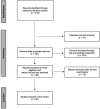The dilemma of polypharmacy in psychosis: is it worth combining partial and full dopamine modulation?
- PMID: 35815937
- PMCID: PMC9521590
- DOI: 10.1097/YIC.0000000000000417
The dilemma of polypharmacy in psychosis: is it worth combining partial and full dopamine modulation?
Abstract
Antipsychotic polypharmacy in psychotic disorders is widespread despite international guidelines favoring monotherapy. Previous evidence indicates the utility of low-dose partial dopamine agonist (PDAs) add-ons to mitigate antipsychotic-induced metabolic adverse effects or hyperprolactinemia. However, clinicians are often concerned about using PDAs combined with high-potency, full dopaminergic antagonists (FDAs) due to the risk of psychosis relapse. We, therefore, conducted a literature review to find studies investigating the effects of combined treatment with PDAs (i.e. aripiprazole, cariprazine and brexpiprazole) and FDAs having a strong D 2 receptor binding affinity. Twenty studies examining the combination aripiprazole - high-potency FDAs were included, while no study was available on combinations with cariprazine or brexpiprazole. Studies reporting clinical improvement suggested that this may require a relatively long time (~11 weeks), while studies that found symptom worsening observed this happening in a shorter timeframe (~3 weeks). Patients with longer illness duration who received add-on aripiprazole on ongoing FDA monotherapy may be at greater risk for symptomatologic worsening. Especially in these cases, close clinical monitoring is therefore recommended during the first few weeks of combined treatment. These indications may be beneficial to psychiatrists who consider using this treatment strategy. Well-powered randomized clinical trials are needed to derive more solid clinical recommendations.
Copyright © 2022 The Author(s). Published by Wolters Kluwer Health, Inc.
Figures
Similar articles
-
Comparative Tolerability of Dopamine D2/3 Receptor Partial Agonists for Schizophrenia.CNS Drugs. 2020 May;34(5):473-507. doi: 10.1007/s40263-020-00718-4. CNS Drugs. 2020. PMID: 32246399 Review.
-
Dopamine partial agonists: a new class of antipsychotic.CNS Drugs. 2004;18(4):251-67. doi: 10.2165/00023210-200418040-00005. CNS Drugs. 2004. PMID: 15015905 Review.
-
Brexpiprazole: a new leaf on the partial dopamine agonist branch.Australas Psychiatry. 2018 Feb;26(1):92-94. doi: 10.1177/1039856217732473. Epub 2017 Oct 10. Australas Psychiatry. 2018. PMID: 29017334 Review.
-
The ABC's of dopamine receptor partial agonists - aripiprazole, brexpiprazole and cariprazine: the 15-min challenge to sort these agents out.Int J Clin Pract. 2015 Nov;69(11):1211-20. doi: 10.1111/ijcp.12752. Epub 2015 Oct 18. Int J Clin Pract. 2015. PMID: 26477545 No abstract available.
-
Impulse Control Disorders by Dopamine Partial Agonists: A Pharmacovigilance-Pharmacodynamic Assessment Through the FDA Adverse Event Reporting System.Int J Neuropsychopharmacol. 2022 Sep 28;25(9):727-736. doi: 10.1093/ijnp/pyac031. Int J Neuropsychopharmacol. 2022. PMID: 35639870 Free PMC article.
Cited by
-
A systematic review and meta-analysis of the effects of combined aripiprazole on glycolipid metabolism in schizophrenia.Front Psychiatry. 2025 Jan 10;15:1496986. doi: 10.3389/fpsyt.2024.1496986. eCollection 2024. Front Psychiatry. 2025. PMID: 39866685 Free PMC article. Review.
References
-
- Adan-Manes J, Garcia-Parajua P. (2009). Aripiprazole in combination with other antipsychotic drugs may worsen psychosis. J Clin Pharm Ther 34:245–246. - PubMed
-
- Ahuja N, Lloyd AJ. (2007). Aripiprazole and worsening of psychosis: a case report. J Clin Psychiatry 68:805–806. - PubMed
-
- Ahuja N, Lloyd AJ. (2008). Worsening of psychosis in a 30 year old man with undifferentiated schizophrenia. Ann Clin Psychiatry 20:113–114. - PubMed
-
- Alptekin K, Hafez J, Brook S, Akkaya C, Tzebelikos E, Ucok A, et al. . (2013) Aripiprazole versus other atypical antipsychotics for schizophrenia. Cochrane Database Syst Rev 13:CD006625. - PubMed
-
- American Psychiatric Association A. (2013) Diagnostic and Statistical Manual of Mental Disorders (DSM-5®). American Psychiatric Publishing.
Publication types
MeSH terms
Substances
LinkOut - more resources
Full Text Sources
Medical


